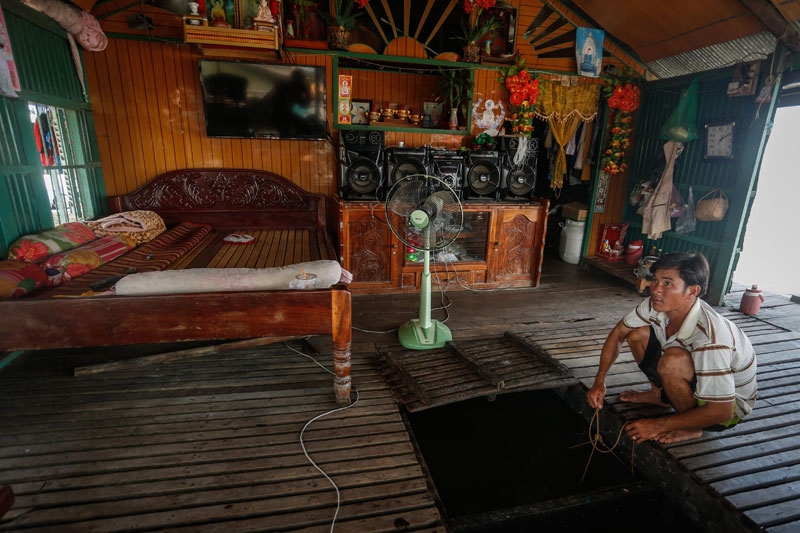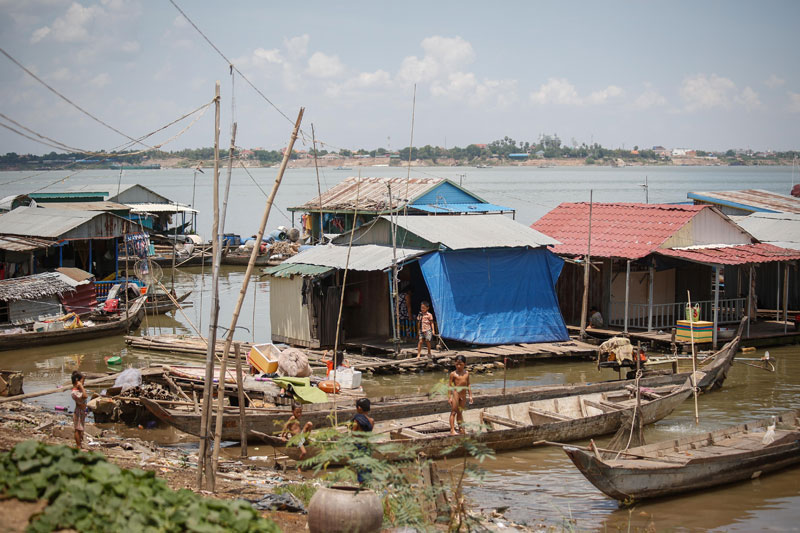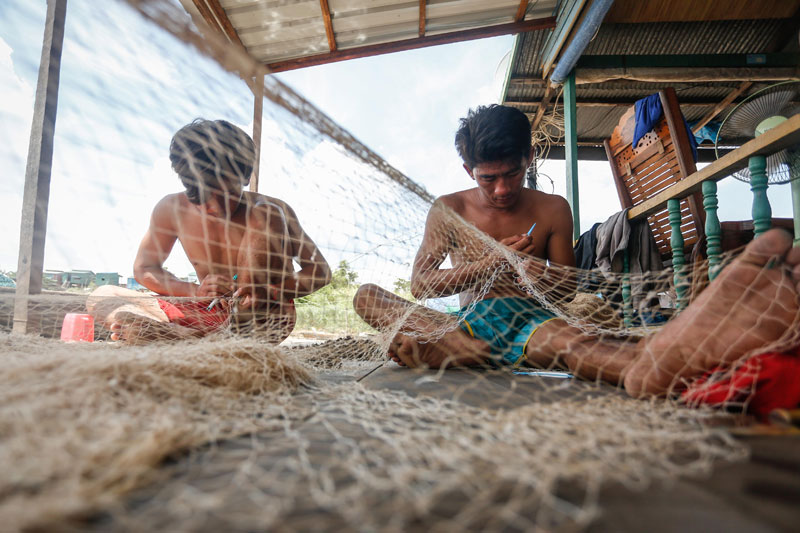AKREI KHSAT COMMUNE, Kandal province – Along the craggy eastern bank of the Mekong River, a community of fish breeders is preparing to detach their floating homes and let the current carry them away.
Per an order from the Lvea Em district office, dated June 5, all those living on the water around the Akrei Khsat Ferry terminal, which connects Phnom Penh with rural Kandal, have until June 22 to leave.

“I already left this place four days ago,” said Lay Yang Vang, a 38-year-old aquaculturist who was visiting friends in the community Wednesday. “We have no right to complain, we just have to do what we are told.”
The order to vacate, signed by district governor Bun Theng, states that “foreigners” and others “living anarchically” around the Akrei Khsat Ferry dock must remove their homes and the fish-breeding pens attached to them.
On June 25, the order says, provincial “joint forces” will remove any remaining structures and “the authorities will not be responsible for the loss or destruction of any materials.”
“They say we have to leave for environmental reasons; I don’t understand this,” Mr. Vang said, “because all we are doing is living and breeding fish.”
In their homes Wednesday, the chiefs of Akrei Khsat village and Akrei Khsat commune explained that the almost exclusively Vietnamese community was being forced to move for environmental and aesthetic reasons.
“Those anarchists can no longer live in those places,” said village chief Khlout Oeun. “Every day, they take leftover food from restaurants and put it in the river to feed their fish; this is pollution.”
“They should go to another place down the river, there are hundreds of families living further down there,” he added.

According to Mr. Oeun, 19 families had already heeded the warning and relocated, while 36—including three Cambodian families—remain subject to the order. A total of 71 timber-and-net fish pens, essentially underwater extensions of the floating homes, must also be moved, he said.
Asked to clarify the motive for the eviction, Mr. Theng, the district governor, referred questions to provincial governor Mao Phirun, who gave a different reason for the order.
“Those people are living on state land and they do not have proper identification,” Mr. Phirun said. “They are illegal immigrants and we cannot allow them to live there anymore; we are implementing the immigration law.”
Aboard one of the floating houses, Wing Ling, a 29-year-old who says he was born in Cambodia to Vietnamese parents but does not have a local identification card, explained the financial losses he and others stood to incur if they were forced to leave Akrei Khsat.
While attaching sinkers to old fishing nets, Mr. Ling explained how most in the floating houses were 18 months into a two-year breeding cycle that would end in about February, when the fish would be mature for sale.
“At that time, I could have between one ton and three tons of fish to sell,” he said, explaining that depending on the breed and health, most of his product would sell for between $1.50 and $2 per kg.
“The buyers come from Phnom Penh to buy our fish,” he said. “But if I have to sell now, I could lose between $5,000 and $6,000.”

Another fisherman, who gave the Khmer name Chan Thy and said he had been living in the country for 30 years, said he demolished his floating home Tuesday and moved his family of four onto a small fishing boat, on which he had built shelter from shoddy timber and rusted corrugated iron.
“My children go to school here, so I don’t want to leave,” he said, looking up the bank to Akrei Khsat. “But the authorities have already come and told me to remove this roof, so I don’t know what will happen next.”
On the shore, Ley Trey Tha, a 55-year-old noodle seller who said she has been living in Akrei Khsat since 1980, said efforts to evict the fish breeders were senseless.
“If they aren’t allowed to raise their fish, what will the people eat?” she said. “There are no more wild fish in the river.”
“Those people live in difficult conditions and they have never caused any trouble,” she added.
Back on the water, Mr. Vang, who vacated four days ago, spoke more freely about life on the water near the dock than those who had yet to move.
He said that since coasting to Akrei Khsat from a similar community attached to the Chroy Changva peninsula in 2011, he had been subject to irregular bouts of extortion from local officials.
Around Pchum Ben, Khmer New Year, the Water Festival—and even when tensions flared between Cambodia and Thailand at Preah Vihear—police officers would stop by to collect “donations.”
“For water festival, they said we should donate to the racers,” he said. “We also donated $10 per family when there was fighting at Preah Vihear.”
“We can’t complain, it’s voluntary,” he added.
And with his change of location, the informal payments have not stopped. After detaching from the rest of the village over the weekend, Mr. Vang drifted a few kilometers south to a marine settlement similar to the one he left.
“They have no electricity but they are Vietnamese and they welcomed us,” he said. “We have to pay $100 a year to the land owner but, right now, this is the best option.”



